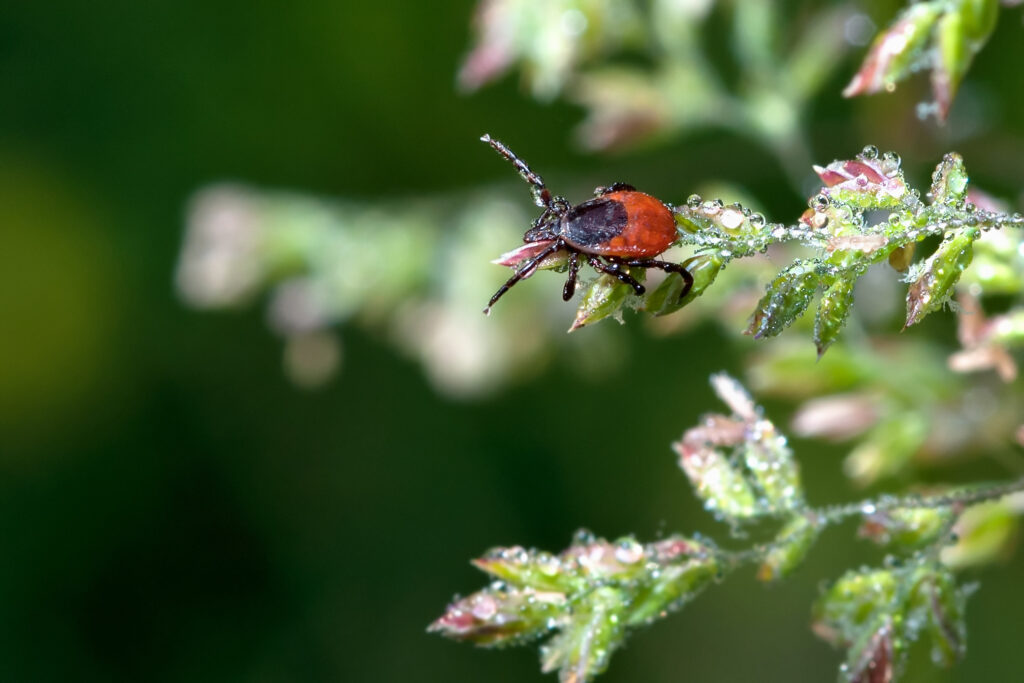Michigan’s Ticking Time Bomb

Things have been different in Michigan lately. The trails aren’t the places of rest they once were. What used to be a simple walk in the woods is now more akin to strolling through a forest full of mini vampires.
I love spending time in the woods, especially during the summer months. I love to jog, check trail cameras, and discover new fishing spots along the Grand River. Lately, though, I’ve turned into a paranoid mess, constantly checking for uninvited hitchhikers. I’m not just talking about the occasional tick here or there. My family has now pulled off ticks numbering in the triple digits. Dozens of these little rascals have been pulled off clothes, dogs, from behind ears, and out from between my legs. Just this year, 20% of my extended family has been diagnosed with Lyme disease, and there’s fear of even worse.
Here’s the thing—these aren’t isolated incidents. This is happening all over Michigan. We’re in the middle of a full-blown tickpocalypse, and no one is talking about it. It’s bringing an unsettling surge of tick-borne illnesses along with it. The Michigan Department of Health and Human Services shared that the number of reported incidents of Lyme disease has risen over 500% since 2000. I had never seen a tick growing up. Now, they’re everywhere.
Why is the tick population exploding? Michigan isn’t alone—the numbers are climbing in Vermont, Massachusetts, the Carolinas: basically everywhere. Some scientists blame climate change, and indeed milder winters and warmer summers lead to more ticks. But that’s far from a complete explanation, as tick numbers are also way up in states with already very warm climates. Another explanation is greater land usage—basically, the more space that humans take up, the more balkanized forests become. The less natural biodiversity, the more ticks enter human environments and affect humans. But scientists also suggest the reverse is true—actually less land is being used for farms today, which leads to a greater tick population.

“[W]hen northeastern farms were abandoned in the 1800s for farms in the Midwest corn belt, the forests took root again, eventually hosting more deer as well. In a 1993 Science paper often still referenced today, researchers pointed to reforestation and the resultant rebound of deer as culprits in the rise of ticks and Lyme disease,” explains PBS.
It’s not just hikers and outdoorsmen that are affected. Both yuppies and hicks are at risk. People who have gardens or visit parks are susceptible. Many folks have to sweep for ticks after simply spending time in their backyards.
The massive tick surge is a serious issue that Michiganders really need to pay attention to.
So, what is a tick? How do you identify one? We’ve got a few species here in Michigan. Each has its own unique characteristics and potential for carrying different sorts of diseases. The most common in my experience is the black-legged tick, known as “deer ticks”.
These little guys are about the size of a sesame seed, black and brown, with soft bodies and eight legs. Like mosquitoes, the females feed on blood. Unlike mosquitoes, they can’t fly. Instead, they hang out on the ends of sticks and grass with their arms outstretched, dead still. As you pass by, they grab onto your pants and start climbing to the warmest parts of your body—pits, private parts, belly button—before digging in.
You don’t have long after they latch on before they can transmit diseases. They’ll dig their heads into your skin to feed, and their saliva often transfers whatever they’ve got directly into your bloodstream. Some say you have a little time before this transfer happens, so quick removal is key, some say it can happen almost immediately.
Not every tick carries disease, but the deer tick can carry several. The most notorious is Lyme disease. If you catch it early, Lyme disease can be knocked out pretty quickly by bombing it with antibiotics. But this isn’t often the case. Small ticks are very hard to find, and the symptoms of Lyme vary greatly. Many folks go years without knowing why they’ve been chronically ill. It breaks bodies down.
So obviously Michigan’s tick problem is serious, but I don’t think we should live in fear. Here’s why:
You can prevent tick bites
Erasmus once said, “Prevention is better than cure.” This is very much true for ticks. Get yourself a bottle of permethrin before you take a hike. Permethrin is a synthetic version of pyrethrins, natural insecticides found in the chrysanthemum flower. I usually grab some from Walmart. Soak your clothes, let them dry, and then hit the woods. It also helps to wear light-colored clothes (so you can see ticks easily), tuck your shirt in, and strap on some boot gaiters.
Still, you’ll want to do regular tick checks once you get back inside. Ticks like heat. So start singing that old Brad Paisley song and get checkin’.
You can deal with tick bites
If you’ve been unlucky enough to become a tick’s latest blood bag, don’t panic. You’re not doomed to a life of Lyme just yet. The key is to get that little vampire off your skin ASAP. The sooner you can pry that sucker off, the lower your chances of catching any nasty diseases.
If you do find a tick has made you its personal buffet, don’t just fling it into the woods or into the garbage. Grab that bugger with some tweezers and pull him out, but instead of squishing it into oblivion (as tempting as that may be), drop it into a plastic baggie.
Why? Because if you start feeling feverish over the next few days, that little baggie could be your ticket to a quick diagnosis and reduced symptoms. Doctors can test the tick for Lyme and other diseases, which could save you a lot of guesswork and misery down the line.
Our tick explosion isn’t slowing down anytime soon, but that doesn’t mean you need to seal yourself up like Bubble Boy. That’s not how Michiganders roll, anyway.
We don’t let Mother Nature tell us what to do. We shovel our driveways in basketball shorts, call blizzards “dustings”, and think of mosquito bites as fashion accessories.
Ticks are certainly hell incarnate, and their numbers are growing, but that won’t stop us from doing what we love.
Tim Dawson is an experienced outdoorsman with a passion for the Mitten State. Follow him on X @TheFairChase1.